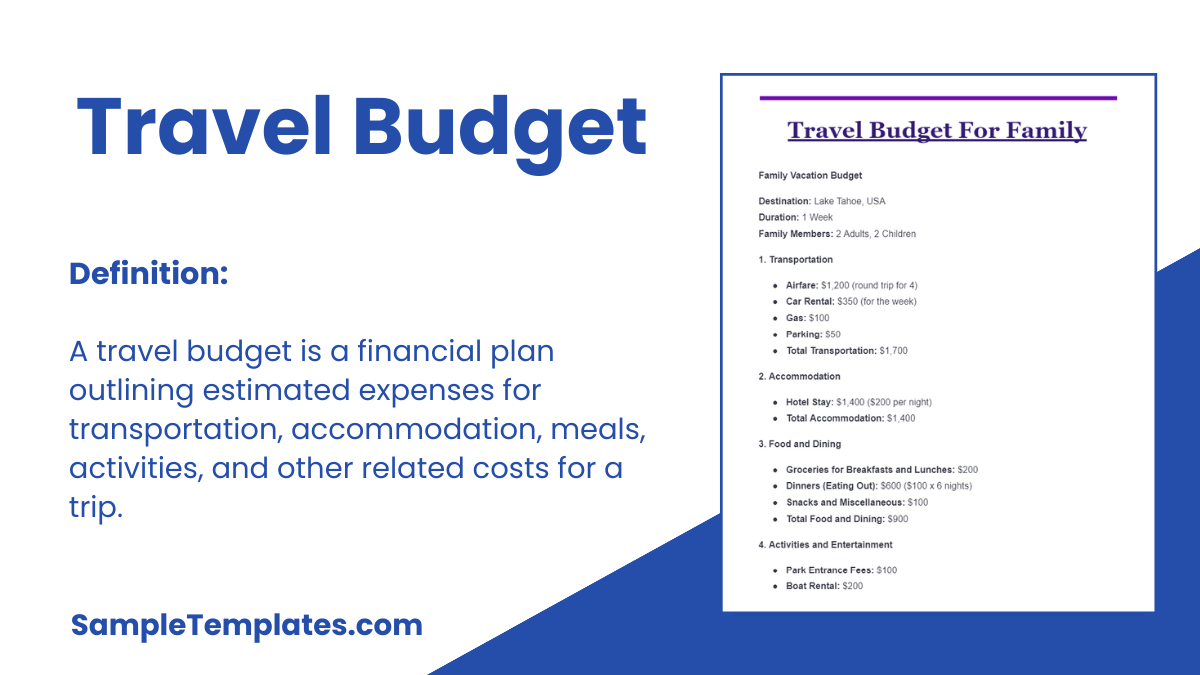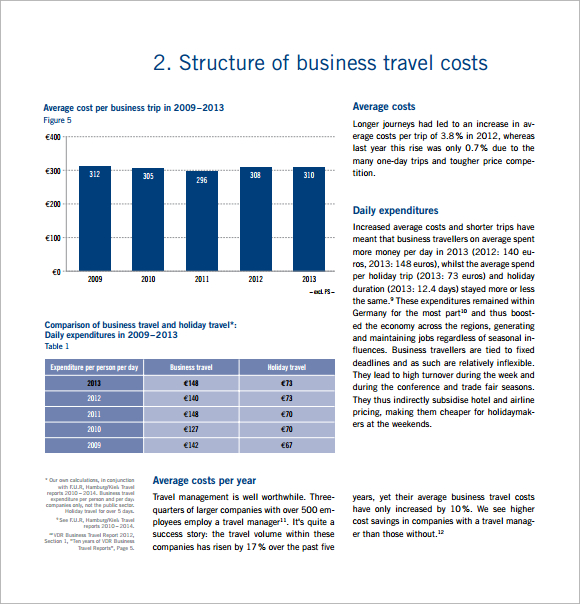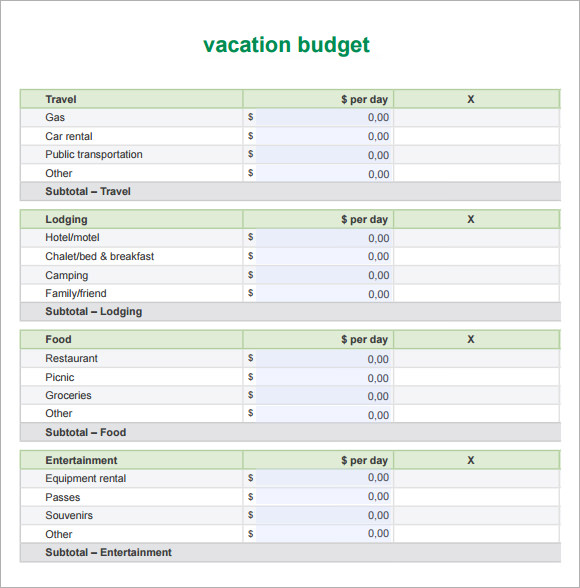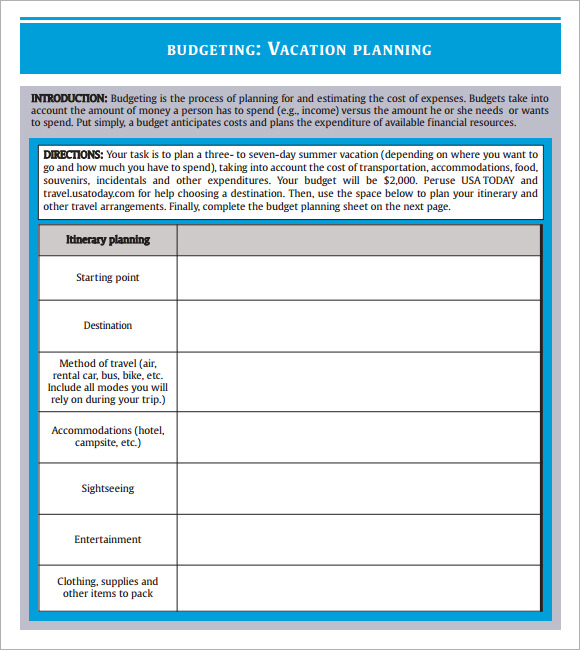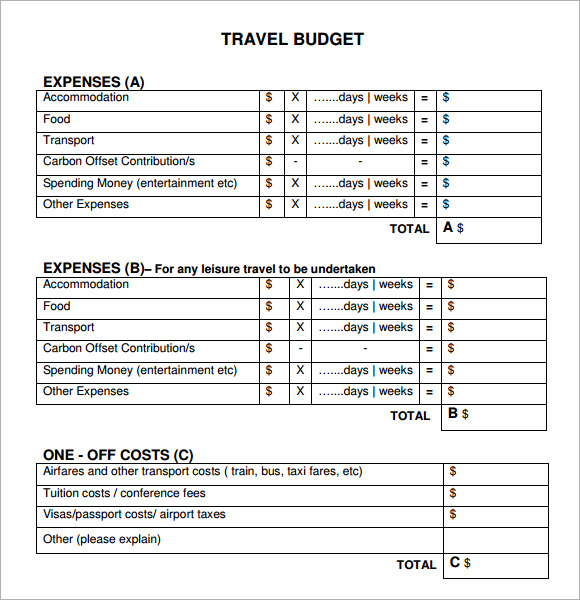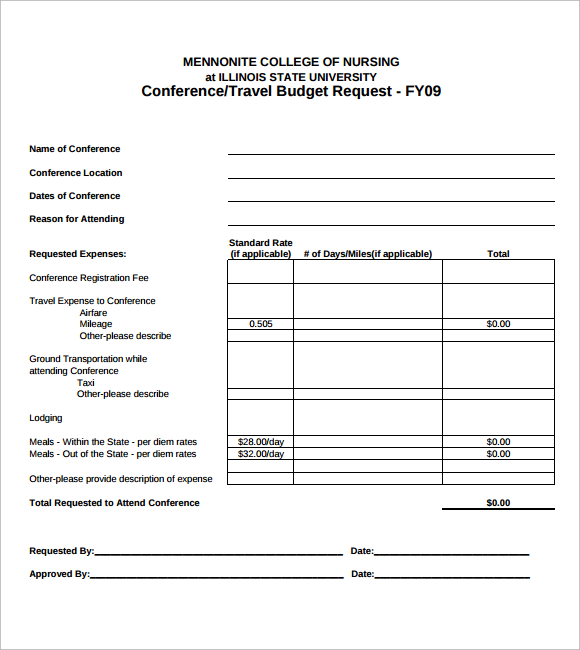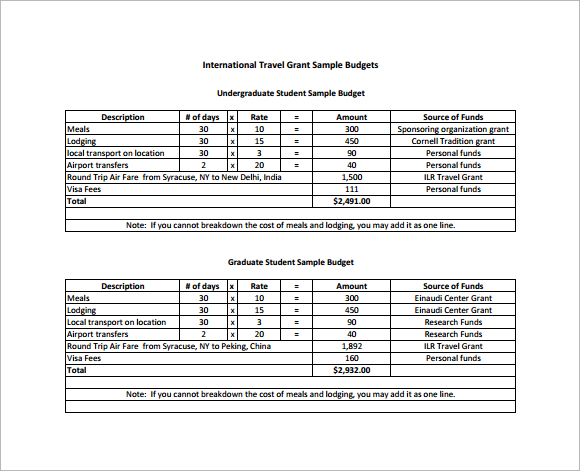Throughout the year we wait, work, and live for a good and enjoyable vacation. Such a vacation becomes more memorable and fully cost effective when you properly plan for it and make the most out of the vacation with a travel budget plan. The most crucial thing about your vacation is the expenses and the monitory factor. When this is under your control everything during a vacation falls in its place easily without creating any hassle for you. Here are few such travel budget templates that could help you ease your work before travelling.
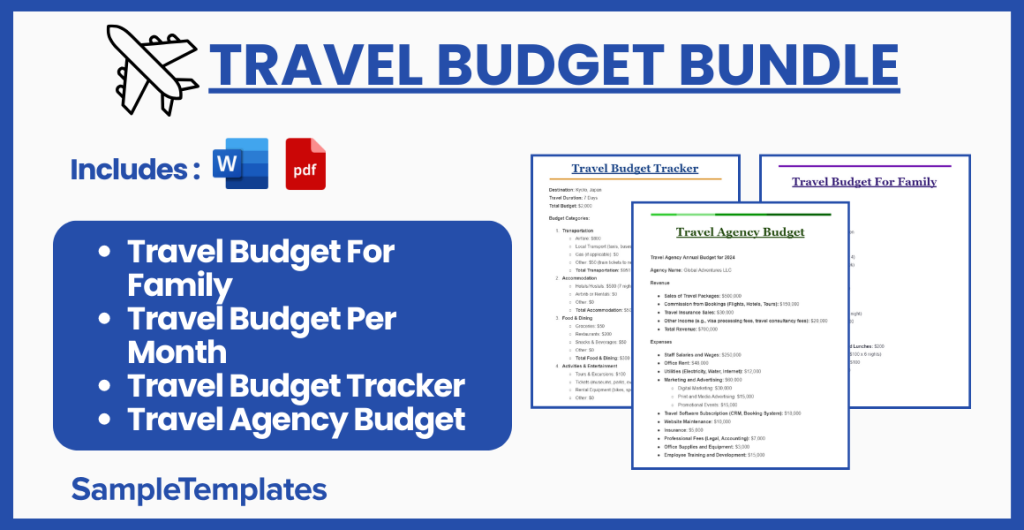
Travel Budget For Family
Family Vacation Budget
Destination: Lake Tahoe, USA
Duration: 1 Week
Family Members: 2 Adults, 2 Children
1. Transportation
- Airfare: $1,200 (round trip for 4)
- Car Rental: $350 (for the week)
- Gas: $100
- Parking: $50
- Total Transportation: $1,700
2. Accommodation
- Hotel Stay: $1,400 ($200 per night)
- Total Accommodation: $1,400
3. Food and Dining
- Groceries for Breakfasts and Lunches: $200
- Dinners (Eating Out): $600 ($100 x 6 nights)
- Snacks and Miscellaneous: $100
- Total Food and Dining: $900
4. Activities and Entertainment
- Park Entrance Fees: $100
- Boat Rental: $200
- Ski/Snowboard Rentals and Lift Tickets (Winter): $500
- Guided Tours: $300
- Souvenirs: $100
- Total Activities and Entertainment: $1,200
5. Miscellaneous
- Travel Insurance: $200
- Emergency Fund: $300
- Total Miscellaneous: $500
Grand Total: $5,700
Notes:
- Airfare and car rental costs are based on early booking discounts.
- Accommodation reflects a family-friendly hotel with complimentary breakfast.
- Food and Dining budget is adjusted for some meals prepared in the hotel room.
- Activities cost varies based on season; budget accounts for both summer and winter activities.
- Travel Insurance is strongly recommended for international trips and is included in the miscellaneous expenses along with an Emergency Fund for unexpected costs.
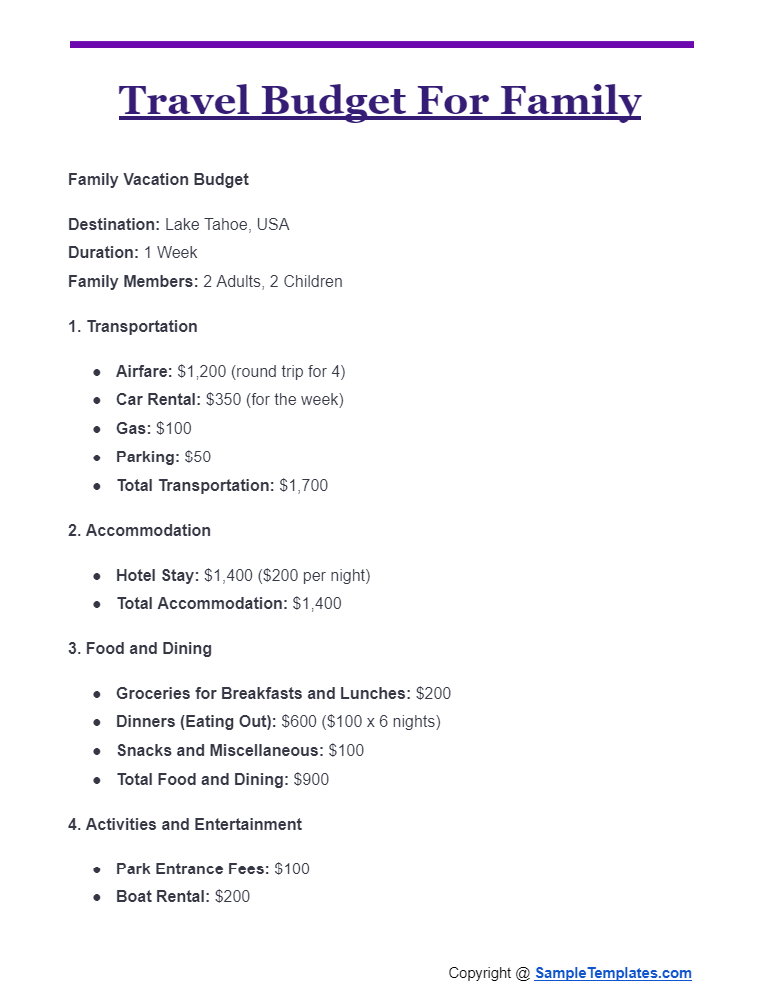
Travel Budget Per Month
Destination: [Destination Name]
Duration: 1 Month
Traveler Type: Solo / Couple / Family
1. Accommodation
- Budget Options: $[XXX] (hostels, budget hotels, shared accommodations)
- Mid-Range: $[XXX] (mid-range hotels, private Airbnb)
- Luxury: $[XXX] (luxury hotels, exclusive rentals)
- Total Accommodation: $[XXX]
2. Food and Dining
- Groceries: $[XXX] (home-cooked or picnic meals)
- Eating Out (Budget): $[XXX] (local eateries, street food)
- Eating Out (Mid-Range to Luxury): $[XXX] (fine dining, touristy places)
- Total Food and Dining: $[XXX]
3. Transportation
- Local Transportation: $[XXX] (public transport, bike rentals)
- Inter-city or Domestic Flights: $[XXX]
- Car Rental: $[XXX]
- Total Transportation: $[XXX]
4. Activities and Entertainment
- Tours and Excursions: $[XXX]
- Museum and Attraction Tickets: $[XXX]
- Outdoor Activities: $[XXX] (hiking, snorkeling, etc.)
- Entertainment (shows, events): $[XXX]
- Total Activities and Entertainment: $[XXX]
5. Miscellaneous
- Travel Insurance: $[XXX]
- Souvenirs and Gifts: $[XXX]
- Mobile Data / SIM Card: $[XXX]
- Emergency Fund: $[XXX]
- Total Miscellaneous: $[XXX]
Grand Total: $[XXX]
Notes:
- The budget varies significantly based on the destination, travel style, and personal preferences.
- It’s advisable to research the cost of living in your chosen destination for accurate budgeting.
- Consider booking accommodations with kitchen facilities to save on dining costs.
- Always have an emergency fund for unexpected expenses.
- Monitor exchange rates if traveling internationally, as fluctuations can impact your budget.
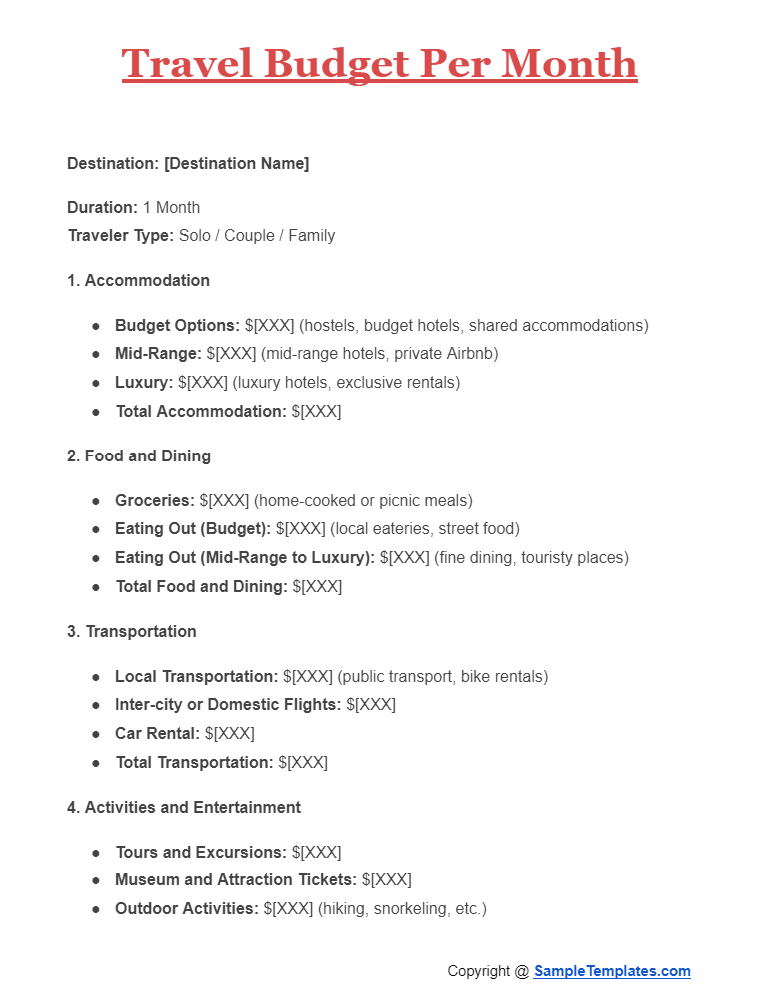
Travel Budget Tracker
Destination: Kyoto, Japan
Travel Duration: 7 Days
Total Budget: $2,000
Budget Categories:
- Transportation
- Airfare: $800
- Local Transport (taxis, buses, rental car): $100
- Gas (if applicable): $0
- Other: $50 (train tickets to nearby cities)
- Total Transportation: $950
- Accommodation
- Hotels/Hostels: $500 (7 nights)
- Airbnb or Rentals: $0
- Other: $0
- Total Accommodation: $500
- Food & Dining
- Groceries: $50
- Restaurants: $200
- Snacks & Beverages: $50
- Other: $0
- Total Food & Dining: $300
- Activities & Entertainment
- Tours & Excursions: $100
- Tickets (museums, parks, events): $80
- Rental Equipment (bikes, sports gear): $20
- Other: $0
- Total Activities & Entertainment: $200
- Shopping & Souvenirs
- Souvenirs: $50
- Clothing: $0
- Other: $0
- Total Shopping & Souvenirs: $50
- Miscellaneous Expenses
- Travel Insurance: $0 (already purchased)
- Emergency Fund: $0 (not part of allocated budget)
- Health/Pharmacy: $0
- Other: $0
- Total Miscellaneous Expenses: $0
Daily Expense Log
| Date | Category | Description | Amount | Notes |
|---|---|---|---|---|
| 03/15 | Transportation | Taxi to hotel | $20 | From airport |
| 03/16 | Activities & Entertainment | Museum ticket | $20 | Kyoto National Museum |
| 03/16 | Food & Dining | Dinner at local restaurant | $30 | Tried Okonomiyaki |
| 03/17 | Shopping & Souvenirs | Souvenirs for family | $50 | Keychains and postcards |
| 03/18 | Activities & Entertainment | Bike rental | $20 | Explored Arashiyama |
| … | … | … | … | … |
(Repeat for each day of travel)
Totals
- Total Spent: $1,970
- Under/Over Budget: Under by $30
Notes/Reflections:
- The local transport budget was adequate for daily travel around Kyoto. Taking the bus was not only cheaper but also an enjoyable way to see the city.
- Dining out was relatively affordable, and local cuisine was a highlight of the trip. Planning meals ahead and choosing restaurants outside of tourist hotspots saved money.
- The bike rental was a cost-effective way to explore more extensively and avoid public transport costs for a day.
- Staying under budget allowed for a stress-free end to the trip, emphasizing the importance of tracking expenses daily.
Travel Agency Budget
Travel Agency Annual Budget for 2024
Agency Name: Global Adventures LLC
Revenue
- Sales of Travel Packages: $500,000
- Commission from Bookings (Flights, Hotels, Tours): $150,000
- Travel Insurance Sales: $30,000
- Other Income (e.g., visa processing fees, travel consultancy fees): $20,000
- Total Revenue: $700,000
Expenses
- Staff Salaries and Wages: $250,000
- Office Rent: $48,000
- Utilities (Electricity, Water, Internet): $12,000
- Marketing and Advertising: $60,000
- Digital Marketing: $30,000
- Print and Media Advertising: $15,000
- Promotional Events: $15,000
- Travel Software Subscription (CRM, Booking System): $18,000
- Website Maintenance: $10,000
- Insurance: $5,000
- Professional Fees (Legal, Accounting): $7,000
- Office Supplies and Equipment: $3,000
- Employee Training and Development: $15,000
- Travel Expenses for Familiarization Trips: $25,000
- Miscellaneous Expenses: $5,000
- Total Expenses: $458,000
Net Profit
- Net Profit (Total Revenue – Total Expenses): $242,000
Budget Notes and Assumptions
- Sales Projections are optimistic, based on expanding our digital marketing efforts and launching new, exclusive travel packages targeting luxury and adventure travel markets.
- Expense Projections account for a planned 5% increase in staff wages and a strategic investment in marketing to drive sales growth.
- Marketing and Advertising funds are heavily allocated towards digital channels, including social media and search engine marketing, to target millennials and Gen Z travelers, who are our fastest-growing customer segments.
- Travel Software Subscription includes a new booking system that offers better integration with supplier systems, aiming to improve operational efficiency.
- Website Maintenance is higher this year due to a major redesign project aimed at improving user experience and incorporating AI chat support.
- Employee Training will focus on destination knowledge for emerging travel markets and sales techniques to improve conversion rates.
- Familiarization Trips are planned for new destinations in Southeast Asia and South America, expanding our portfolio and ensuring our travel consultants have firsthand experience to share with clients.
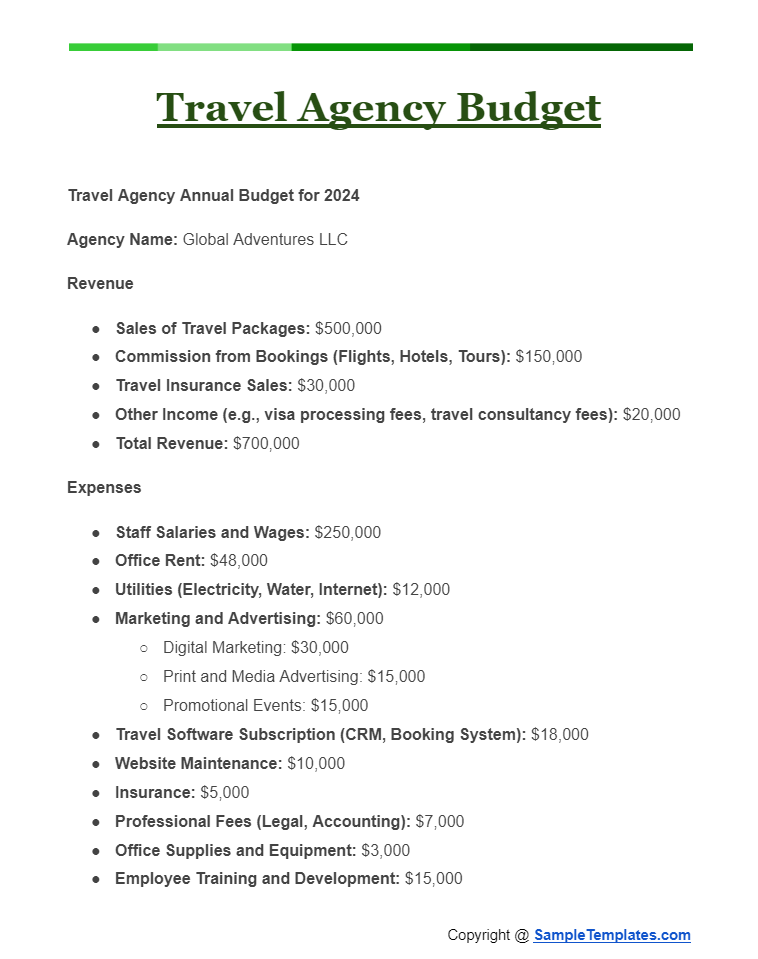
Browse More Templates On Travel Budget
Travel Budget Template Sample
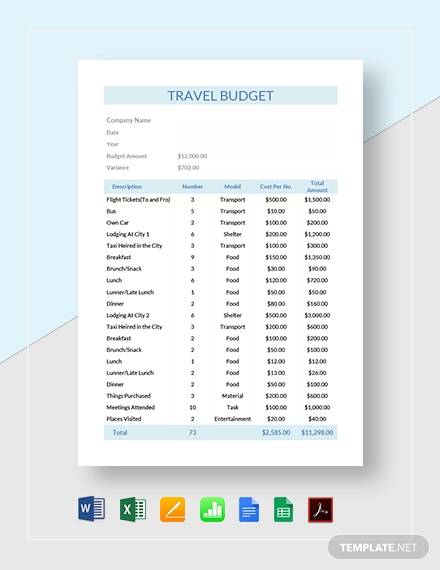
Travel Budget Worksheet Template
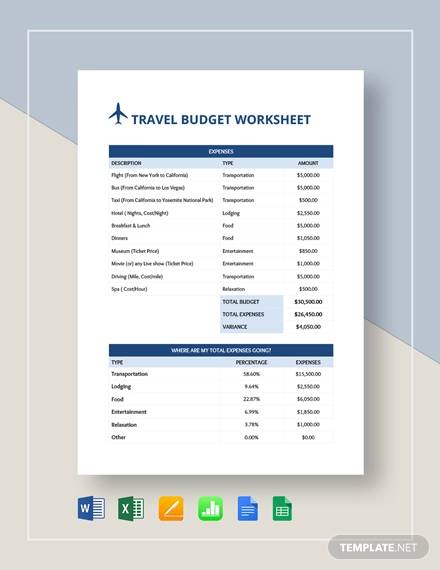
Tips For Writing a Travel Budget
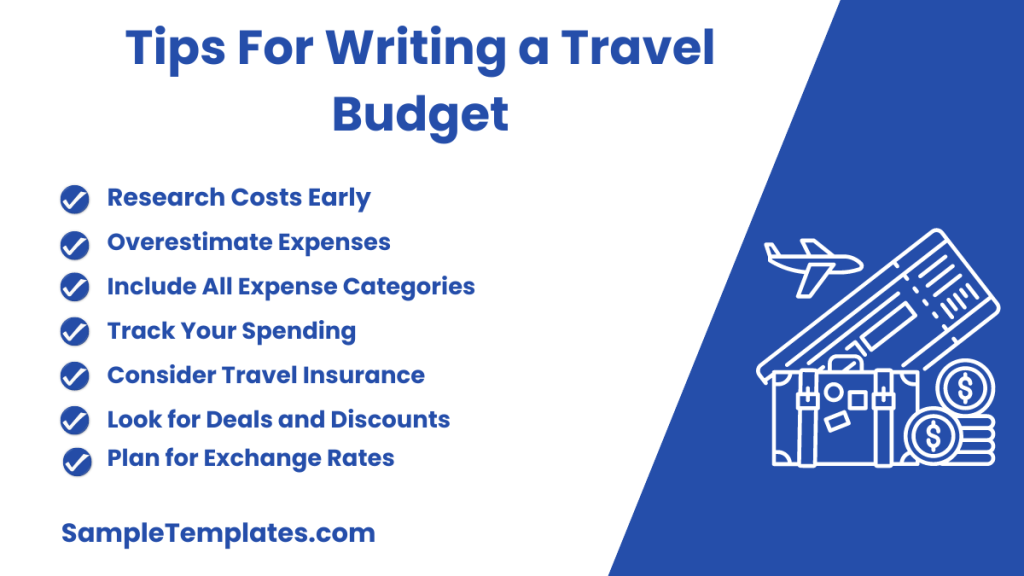
- Research Costs Early: Start by researching the costs associated with your destination, including accommodation, transportation, food, and activities. This will give you a baseline for your daily spending.
- Overestimate Expenses: Always round up your estimates. It’s better to overestimate and have money left over than to find yourself short. Include a contingency fund for unexpected expenses.
- Include All Expense Categories: Make sure your budget covers every possible expense, including flights, accommodations, local transportation, meals, entertainment, souvenirs, and even tips.
- Track Your Spending: Use an app or a spreadsheet to keep track of your spending as you go. This will help you stay on budget and make adjustments if necessary.
- Consider Travel Insurance: Don’t forget to factor in the cost of travel insurance. It’s an added expense that can save you a lot of money in case of unexpected events.
- Look for Deals and Discounts: Always be on the lookout for deals on flights, accommodations, and activities. Consider traveling during the off-season for lower prices.
- Plan for Exchange Rates: If you’re traveling internationally, consider the exchange rate and bank fees for currency exchange. It’s often cheaper to withdraw money from ATMs abroad than to exchange currency before you leave.
- Save on Meals: Plan to save on food expenses by choosing accommodations with breakfast included or a kitchenette where you can prepare some of your own meals. Also, explore local markets and eat where the locals do to get better deals.
Corporate Travel Budget Template
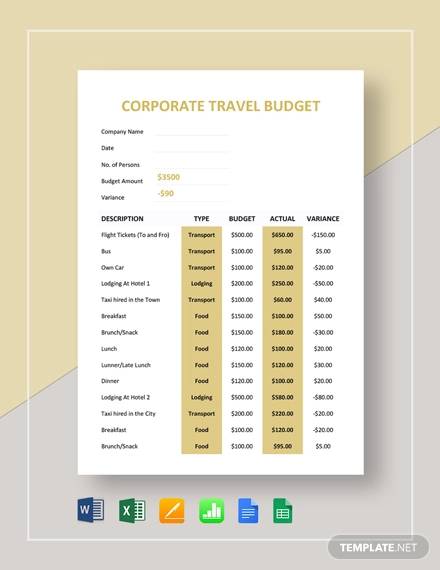
Vacation Travel Budget Template
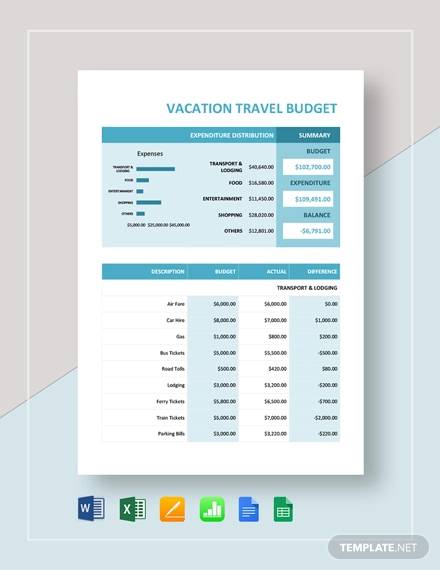
Simple Annual Travel Budget Template
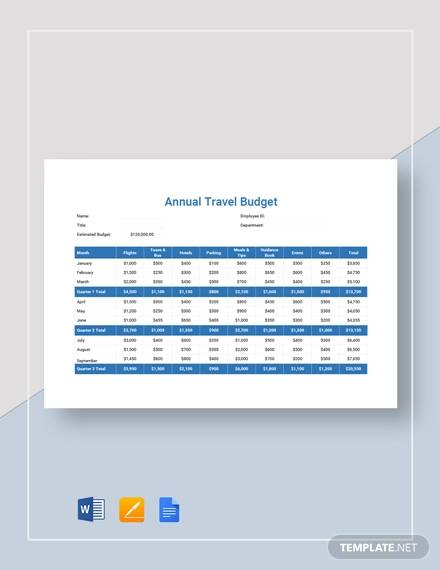
Business Travel Budget Template
For the purpose of business many people travel throughout the year across the country. There remain a number of expenditures while in trip and the most important of all is that you have to show your expenditures. Here is a template for you that could proof beneficial to maintain records of not only you but your team mates as well.
Vacation Travel Budget Template
Always you can depend on a template like the one mentioned here to plan for your hassle free and well budgeted vacation. This template helps you to chalk out beforehand your each and every program while travelling like transportation, meals, lodging, visits, sight scene etc, so that you remain tension free when you are out with your family.
Corporate Travel Budget Template
Corporate travelling is expensive and requires a proper well chalked out travel budget. Though the expense will be entirely covered by your company still it is required to maintain and chalk out a planned budget for avoiding miscommunication among colleagues and employer. This travel budget template mentioned here for the purpose is easy to work with and helpful.
Importance of Travel Budget
- Financial Control: A travel budget helps you understand and manage your expenses, ensuring you don’t overspend and face financial issues during or after your trip.
- Prioritization of Expenses: It allows you to prioritize your spending, ensuring you allocate funds to the experiences most important to you, whether that’s dining, adventures, or cultural visits.
- Avoids Debt: By planning sample your expenses ahead of time, you’re less likely to resort to credit and accumulate debt, making your trip financially sustainable.
- Emergency Preparedness: Including a contingency fund in your budget means you’re better prepared for unexpected expenses, reducing stress in emergency situations.
- Enables Smart Decisions: With a clear picture of costs, you can make informed decisions, such as choosing between different modes of transport or types of accommodation, based on what fits your budget.
- Facilitates Goal Setting: A sample budget helps in setting achievable travel goals. Knowing your financial limit guides you in selecting destinations and activities that are within your means.
- Enhances the Travel Experience: By reducing financial worries, a well-planned budget lets you enjoy the travel experience fully, focusing on the adventure rather than fretting over costs.
- Promotes Savings: Knowing how much you need allows you to save effectively in the lead-up to your trip, ensuring you have the funds needed to enjoy your journey fully..
Travel Budget Planner
Team Travel Budget Template
Conference Travel Budget Template
Benefits Of Travel Budget
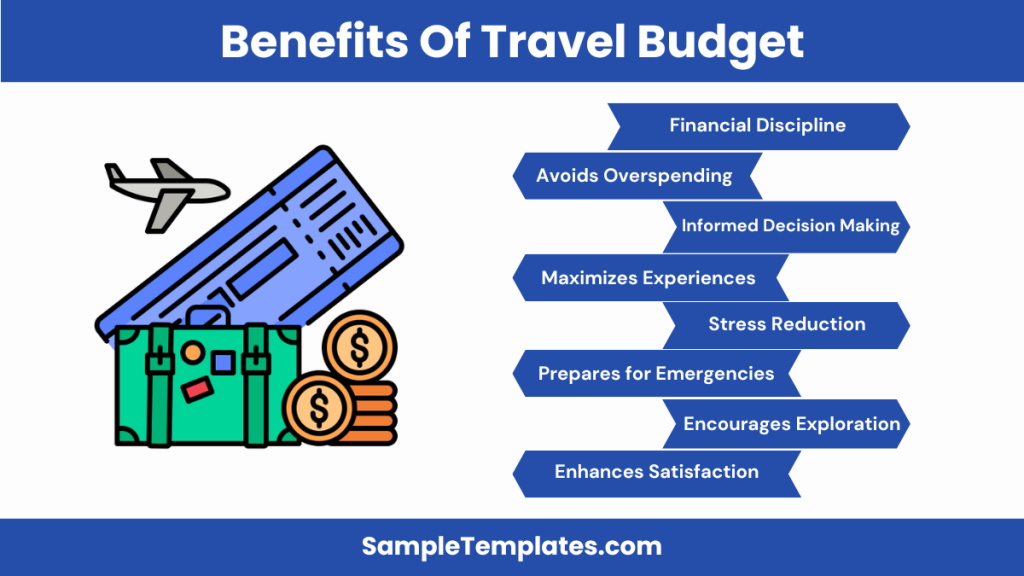
Creating a travel budget offers numerous benefits that enhance the overall travel experience, making your adventures more enjoyable and stress-free. Here are some of the key benefits:
- Financial Discipline: A travel budget instills financial discipline both before and during your trip. It encourages saving and ensures that spending aligns with your financial capacity, preventing post-travel financial stress.
- Avoids Overspending: By allocating funds to different aspects of your trip, such as accommodation, food, and activities, you’re less likely to overspend in one area, ensuring a balanced distribution of expenses.
- Informed Decision Making: With a clear understanding of your financial limits, you can make informed choices about destinations, accommodations, and activities that fit within your budget, enhancing your travel experience without breaking the bank.
- Maximizes Experiences: A budget helps you prioritize spending on experiences that matter most to you. Whether it’s a special dinner, an adventurous activity, or a unique cultural experience, you can allocate funds to ensure these highlights don’t get missed.
- Stress Reduction: Knowing you have a financial plan in place reduces anxiety about money, allowing you to relax and enjoy your trip. It eliminates the fear of unexpected expenses and the stress of debt accumulation.
- Prepares for Emergencies: A well-planned travel budget includes a contingency fund for unexpected expenses, providing a safety net that can cover emergencies without derailing your finances.
- Encourages Exploration and Creativity: A budget can inspire you to explore less expensive, off-the-beaten-path experiences and destinations, often leading to more authentic and enriching travel experiences.
- Enhances Post-Travel Satisfaction: By avoiding debt and managing your finances wisely, you’ll return from your trip with positive memories and satisfaction, rather than worries about how to pay off the expenses incurred.
Overall, a travel budget is a powerful tool that ensures your travels are not only memorable and fulfilling but also financially responsible. It enables you to explore the world with confidence, knowing that your adventures are within your means.
International Travel Budget
How to Create a Travel Budget Plan?
Creating a travel budget is nothing but chalking out your probable expenses before you leave for the trip. A travel budget must include expenditures to be incurred after transportation, lodging, and fooding including your meals and refreshments for the entire day, entertainment expenditure, incidentals, gifts, and souvenirs. While you are travelling abroad a money conversion budget should also be included. You may also like Grant Budget Templates.
How much does the average person travel?
The average person might travel 2-3 times a year, often including one major vacation and several shorter trips or weekend getaways, varying significantly by lifestyle, budget, and personal interests
How much money do you really need to travel?
The amount of money needed to travel depends on the destination, type of travel, and duration, but a rough estimate for a modest week-long trip could range from $1,000 to $3,000 per person
What is a good budget for Travelling?
A good budget for traveling should cover transportation, accommodation, food, activities, and a contingency for unexpected expenses, tailored to personal travel style, with daily spending ranging from $50 to $200.
In conclusion, creating and adhering to a travel budget is essential for managing expenses effectively and maximizing the enjoyment of your trip. By planning ahead, tracking spending, and making informed decisions, you can achieve your travel goals within your financial means.
If you have any DMCA issues on this post, please contact us!
Related Posts
Retirement Speech Samples & Templates
Weekly Schedule Samples & Templates
Contractual Agreement Samples & Templates
FREE 9+ Amazing Sample Church Bulletin Templates in PSD | PDF
Sample Business Card Templates
Sample Cashier Job Descriptions
Questionnaire Samples
FREE 10+ Sample HR Resource Templates in PDF
FREE 10+ HR Consulting Business Plan Samples in MS Word | Google Docs | Pages | PDF
FREE 49+ Sample Job Descriptions in PDF | MS Word
FREE 13+ Academic Calendar Templates in Google Docs | MS Word | Pages | PDF
FREE 10+ How to Create an Executive Summary Samples in Google Docs | MS Word | Pages | PDF
FREE 23+ Sample Event Calendar Templates in PDF | MS Word | Google Docs | Apple Pages
Company Profile Samples
FREE 10+ Leadership Report Samples [ Development, Training, Camp ]
